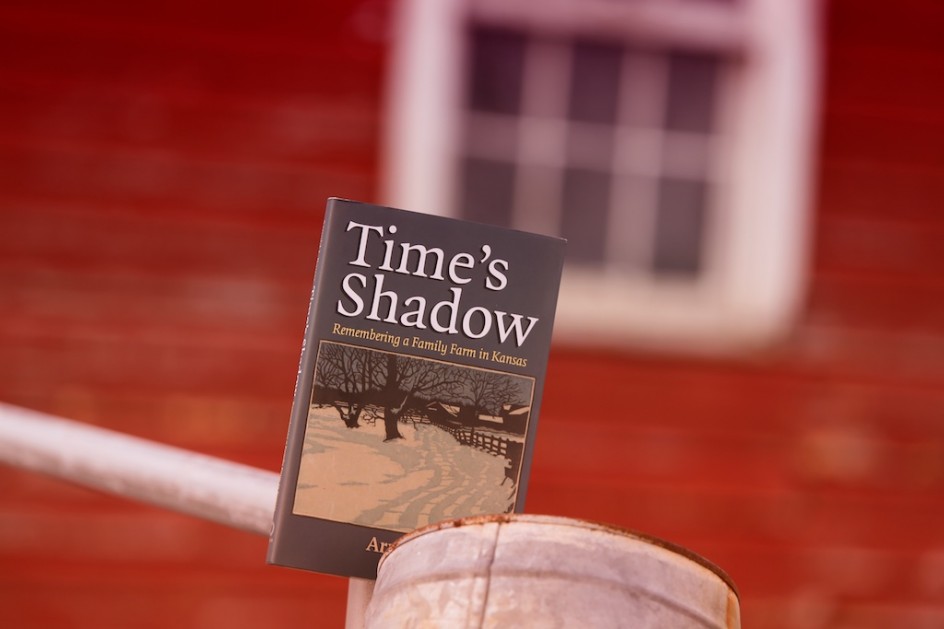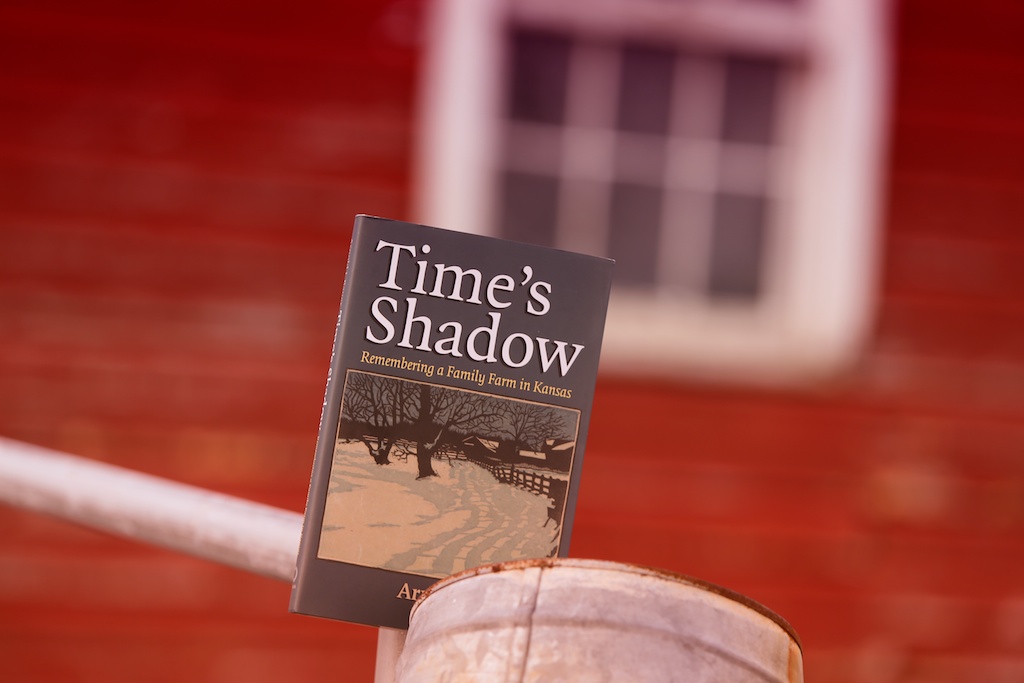
These book reviews are written in conjunction with Battenkill Books, my local independent bookstore. If you wish to purchase this book please consider buying it from Battenkill or your local independent bookstore. You can call the store at 518 677-2515 or e-mail Connie Brooks at [email protected] or visit the store’s website. They take Paypal and ship anywhere in the world. On Saturdays, from 11 a.m. to 1 p.m., I work at the store as Recommender-In-Chief. You can visit me and Red there, call the store or e-mail us. I have a list of great new books out that I’m happy to talk about.
“Time’s Shadow: Remembering A Family In Kansas.” Arnold J. Bauer. The University Of Kansas Press.
Arnold Bauer has written a poignant and lyrical memoir about the 160-acre family farm he grew up in Goshen Township, Clay County Kansas. The rise of the family farms in the Plains States began after the Homesteading Act in 1860 and lasted until the 1960’s, when government policy and other social and economic changes ended the very special century that marked the rise of the Family Farm. The book is the story of 100 years of the Bauer Farm, settled by Germans fleeing Europe and striking out in the new world.
Bauer eventually left his family’s farm to study abroad and teach in California. But the farm shaped him and touched him deeply, and although he is never maudlin, he will make you want to cry for this lost way of life, these vanished values, the grinding yet magical life farm children lived. It is always said that children who grew up on family farms are decades older than their peers. Bauer explains why.
Family farms were unique in America’s social structure. In most families, work and home are separate. On Family Farms, they are the same thing. Children were expected to work, contribute money, keep themselves safe from dangerous animals and equipment. Sometimes they did, sometimes they didn’t. Bauer’s brother was killed in a farming accident when he was twelve. Bauer was taught in a one room schoolhouse, his teachers knew him very well and held him accountable for his homework. Every day before school he had to go and set his muskrat trips so he could earn some extra money. He turned it all over to his mother and father. The idea of an allowance was unheard of, and no one ever asked him if he was having a happy childhood.
Bauer’s portrait of his family is beautiful and haunting. His exhausted parents worked day and night. Bauer’s mother never once spoke directly about her feelings about life, and his generous father helped bring electricity to neighboring farms for little or no money. Work on the farm was difficult and relentless and it shaped Bauer in ways that are almost possible for children to experience now. When Bauer was very young, his sister fell off of a tractor, and his father told him to get on and drive it. “My childhood was over,” he said. The family fought drought, locusts, broiling heat and freezing cold. In the end, Family Farms fed the country and its soldiers through World War II and then began their steady decline. Bauer’s farm was taken over by corporate farmers, the farmhouse permitted to rot away. Ten years after his mother withered away in one nursing home, Bauer took his broken-hearted and independent father to another, where he died four years later.
Almost all of the family farms in Kansas had withered away or been taken over by conglomerates by the mid 1960’s, a process that has spread to the rest of the country as well. Family farms are too small to compete in the new post World War II economy. Few farm children chose to stay and live such difficult lives. The small town where his father took Arnold to buy Milky Way bars for five cents as a reward for hard work was gone, along with most of the county’s population. Goshen Township had become a ghost town.
I am not a farmer, but I live on a farm, and for some years I have been fortunate enough to photograph farmers and their struggle to survive. The family farmer I know are honest, generous and hard-working beyond imagination.They struggle on in the face of overwhelming obstacles, and a world that has left them behind. They seem heroic to me.
“Time’s Shadow” is the best farm memoir I have read. It is wonderfully and simply written, filled with anecdotes and rich characters. It brought me right into the Bauer farmhouse. All across America, farm communities began to empty out as Americans moved to jobs on the coasts and in cities. Bauer never succumbs to false nostalgia and he never romanticizes farm life, which could be insular, painful and difficult as he describes it. His accounts of his family’s days are unsparing. But Family Farms were a keystone in the evolution of America, and the people who lived on them were forever changed and shaped by the work and responsibility demanded of them and the freedom given them to take risks and learn.
Bauer’s education for 14 years in a one room schoolhouse evokes a lost world of intimacy, discipline and shared values. It seems this is a world that is lost forever, thus it is all the more valuable to be able to experience it in this book.
This is one of the best books of 2012, in my reading. I recommend it highly. “Time’s Shadow” was written by Arnold J. Bauer and published by the University Press Of Kansas. “There was something to be learned from this century of my family’s life on a Kansas farm, and something to be loved,” wrote Bauer at the end of his book.
Amen to that.

